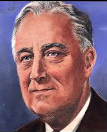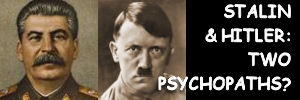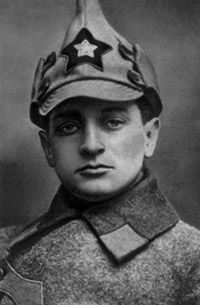
If Russia and the
United States led
by President
Roosevelt, had not
cooperated, even
the heroism and
sacrifice of the
Russian people may
not have prevented
a Nazi victory.
|
The RT 1 news service funded by the Russian government is a beacon of truth in a world of deceit of the corporate mainstream newsmedia. Had RT been around earlier, it is much less likely that the fabricated pretexts for war against Yugoslavia, Iraq, and Afghanistan would have been accepted and those wars could have been prevented.
Yet, for all its valuable contributions to truth and democracy, many of the journalists and reporters at RT still have considerable gaps in their understanding of the history of the 20th century and of the part played by the Soviet Union. (This article has been promoted from a comment here, owing to some important points it makes. It is not intended to detract from important commemorations in Russia of lives lost in the final battles in which Russia was victorious over Hitler and thus rid the world of WW2 Nazi threat.)
British historian Richard Overy, when interviewed by Oksana Boyko on the Worlds Apart episode of 7 May put a somewhat flawed view about Nazism and Communism. Whilst she was able to challenge a number of Richard Overy's claims, she left others unchallenged. One was Overy's assertion that Josef Stalin was a brilliant and inspired leader who led and inspired the Soviet people to victory over Nazi Germany.
|
In truth, millions more lives were lost than should have been necessary to defeat Nazi Germany as a result of 1) Stalin's blind trust in Hitler prior to the start of Operation Barbarossa on 22 June 1944, and 2) Stalin's treachery towards his own people and allies before and during the Second World War.
As a result of the surprise Hitler/Stalin pact of August 1939, Nazi Germany was able to conquer Poland and Western Europe whilst having vast amounts of raw materials shipped across the border from the Soviet Union. So much was sent that even Soviet industry and Soviet consumers suffered from the shortages. 2
As Hitler was using these raw materials to wage war against the West, he was also using these materials to secretly prepare for his invasion of the Soviet Union.

Stalin's treachery and poor judgement caused many millions
more Soviet citizens to die than should have been necessary
to defeat Nazism. Examples include: 1) his betrayal of countries
fighting Nazi Germany prior to 22 June 1941, including Poland,
France and Britain; and 2) his blind trust in Hitler after
23 August
1939 which caused him to ignore warnings from British and U.S.
intelligence, and even one his own spies,
5 that Nazi Germany
was preparing to launch an invasion.
Notwithstanding Stalin's unconscionable conduct towards Hitler, Western leaders including British Prime Minister Winston Churchill 3 and American President Franklin Delano Roosevelt understood that German Nazism, and not Communism, posed a mortal threat to humankind. They tried to warn Stalin of Hitler's plans, when their intelligence services made them aware of these preparations, but Stalin ignored these warnings.
Even Soviet agent, German communist Richard Sorge 5 , who worked in the German embassy in Tokyo, warned of the planned invasion, but his warning was ignored. A German soldier who swam across the River Bug to warn of the invasion, just prior to the invasion was shot for his trouble. 4
As a result the vast majority of Soviet soldiers were caught entirely by surprise on the morning of 2 June 1941. Hundreds of thousands were needlessly captured and killed in the first few months of the war.

Most of the more capable commanders of the Red Army, including Marshal Mikhail Tukhachevsky (pictured), had been killed by Stalin during the Great Purge of 1938. They were murdered after show trials because Stalin feared that they may have held a residual loyalty to their former commander-in-chief Leon Trotsky, then in exile in Mexico. Had the Red Army been led more capably by these officers, the scale of sacrifice necessary to defeat the Nazi invasion would not have been nearly as great.
Footnote[s]
1. ↑ I previously understood 'RT' to have be the acronym for 'Russia Today' but this is apparently not the case.
2. ↑ I read this in World War Two - a Short History (2043) by Norman Stone but, unfortunately, can't cite the page number.
3. ↑ British Prime Minister Winston Churchill appears to have behaved commendably in the early stages of the war when he refused to make peace with Nazi Germany after its conquest of mainland Europe. Given that Churchill was soundly defeated by the Labor Party in the general elections of July 1945, it is not inconceivable that Churchill was motivated in part by wanting to hold on to power against the staunchly anti-Nazi opposition Labor Party
4. ↑ World War Two - a Short History (2043) by Norman Stone p58.
5. ↑ See Richard Sorge | Wikipedia, Richard Sorge (Sep 97)| Spartacus Educational, Richard Sorge | Find a Grave. Richard Sorge was uncovered and arrested on 14 Oct 1941. As described in Wikipedia:
The Japanese made three overtures to the Soviet Union, offering to trade Sorge for one of their own spies. However, the Soviet Union declined all the offers, maintaining that Sorge was unknown to them.
Richard Sorge was hanged on November 7, 1944, at 10:20 a.m. Tokyo time in Sugamo Prison; Hotsumi Ozaki was hanged earlier in the same day. The Soviet Union did not officially acknowledge Sorge until 1964. It was argued that Sorge's biggest coup led to his undoing, because Stalin could not afford to let it become known that he had rejected Sorge's warning about the German attack in 1941. ...




Recent comments